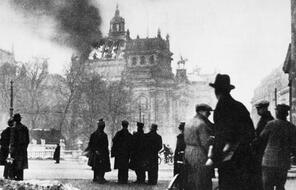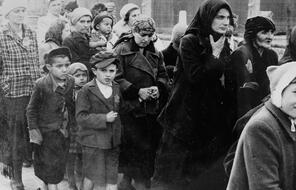The November Revolution
At a Glance
Language
English — USSubject
- History
- Human & Civil Rights
- The Holocaust
By fall 1918, the military leaders of Germany knew that they could not win World War I. In hopes of gaining more favorable terms when they surrendered to the Allies, German generals urged the liberal Prince Max von Baden to form a new German government that was more democratic than the monarchy under the kaiser. But Baden was unable to control the navy, whose leaders wanted to go down fighting rather than surrender. In October 1918, when navy ships sailed to fight the British fleet, German sailors, refusing to begin a battle they were likely to lose, mutinied against their admirals. The news of the mutiny touched off uprisings in support of the sailors throughout Germany. 1 Ernst Toller, a German poet and playwright, described the demonstrations:
First Kiel, then Munich, then Hanover, Hamburg, the Rhineland, Berlin. On November 9th, 1918, the Berlin workers left the factories and marched in their thousands from north, south, and east to the center of the city—old gray men and women who had stood for years at the munitions benches, men invalided out of the army, boys who had taken over their fathers’ work. The processions were joined by men on leave, war-widows, wounded soldiers, students and solid citizens. No leader had arranged this uprising. . .
The procession marched on in silence; there was no singing, no rejoicing. It came to a standstill before the gates of the Maikäfer Barracks. The gates were barred; rifles and machine-guns threatened from every window and loop-hole. Would the soldiers shoot?
But the men in field-gray were the brothers of these ragged, starving crowds. They flung down their weapons, the gates were opened and the people streamed into the barracks and joined forces with the Kaiser’s army. . . . The ruling powers gave in without a struggle, the officers surrendered. . . . 2
As a result of the unrest, Kaiser Wilhelm, Baden, and other German leaders in the monarchy abdicated, or gave up their power, and left the country. On November 10, the Berliner Tageblatt, a conservative newspaper, summed up the events of the previous day: “Yesterday morning, everything was still there [the kaiser, the chancellor, the chief of police]; yesterday afternoon nothing of all that existed any longer." 3 The Social Democrats, the political party that had the largest number of delegates in the Reichstag (the German parliament), were now in charge of the country.
But the Social Democrats, under the leadership of Friedrich Ebert, struggled to keep order. Radical groups and other political parties also tried to seize power in the confusion that followed the end of the war and of the monarchy. They took control of many city halls and state governments across the country. The war was over, the German empire had fallen, and now the question was whether Germany could create a new future and what kind of society it would become.
Connection Questions
- What kinds of challenges face a society in the immediate aftermath of a war?
- What was "revolutionary" about the events of November 9-10, 1918?
- What motivated the protesters? Why did members of the military refuse to stop the protests?
- 1Richard J. Evans, The Coming of the Third Reich (New York: Penguin, 2003), 61–62.
- 2Ernst Toller, I Was a German: The Autobiography of Ernst Toller, trans. Edward Crankshaw (St. Paul, MN: Paragon House, 1990), 139–40.
- 3Quoted in Peter Fritzsche, Germans into Nazis (Cambridge, MA: Harvard University Press, 1998), 89.
How to Cite This Reading
Facing History & Ourselves, "The November Revolution," last updated August 2, 2016.








